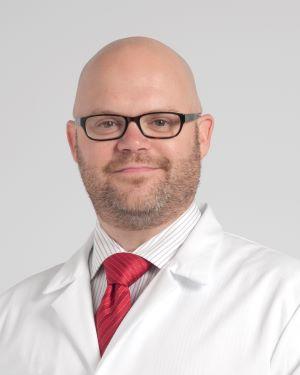Brian Southern Laboratory
-
Brian Southern Laboratory
- Principal Investigator
- Research
- Our Team
- Publications
- Careers
- Research News
Research
Biography
Dr. Southern is a Staff Physician in the Respiratory Institute and Assistant Professor of Molecular Medicine at the Cleveland Clinic Lerner College of Medicine of Case Western Reserve University. He has a secondary appointment as an Associate Staff Scientist in the Lerner Research Institute Department of Pathobiology, where his research focus is Idiopathic Pulmonary Fibrosis (IPF). Dr. Southern explores how fibroblasts and myofibroblasts (the scar-producing cells in IPF) interact with lung tissue matrix to propagate fibrosis. He has identified that the molecular motor protein, non-muscle myosin II, is a critical molecule driving fibrosis, and is further characterizing the myosin II pathway in fibroblasts in order to identify novel targets to halt fibrosis in patients with IPF.
In addition to his research activities, Dr. Southern conducts an outpatient clinic where he cares for patients with interstitial lung disease and sarcoidosis, and he is a co-investigator on a number of clinical trials for patients with IPF. He serves as the physician leader for the Cleveland area Pulmonary Fibrosis Support Group.
Education & Professional Highlights
Education & FellowshipsFellowship - Case Western Reserve University - University Hospitals of Cleveland
Pulmonary & Critical Care Medicine
Cleveland, OH USA
2012
Residency - Case Western Reserve University - University Hospitals of Cleveland
Internal Medicine
Cleveland, OH USA
2009
Medical Education - University of Alabama School of Medicine
Birmingham, AL USA
2003
Undergraduate - University of Alabama at Birmingham
Birmingham, AL USA
1996
- Dr. Southern has been invited to present his research findings at local and national meetings, including the American Thoracic Society International Conference, the Keystone Symposium on Fibrosis,and the Society for Clinical Research/Midwestern Section American Federation for Medical Research (CSCR/MWAFMR). He has been awarded research funding from the National Institutes of Health (NIH), the Parker B Francis Foundation, Genentech, Inc., and the Cleveland Clinic Research Program Committee. He has served as a grant reviewer for the Department of Defense Congressionally Directed Medical Research Programs (CDMRP), the Foundation for Sarcoidosis Research, and the Cleveland Clinic Research Program Committee. He reviews manuscripts for a number of scientific journals. He also supervises pulmonary fellows in the Interstitial Lung Disease Clinic and on the inpatient pulmonary consult service. Additionally, he serves as a volunteer physician at the Free Medical Clinic of Greater Cleveland.
- Internal Medicine - Pulmonary Disease
- Internal Medicine - Critical Care Medicine
- 2017 NIH K08 Award
- 2017 Parker B Francis Fellowship Award (declined)
- 2017 Parker B Francis Research Opportunity Award
- 2015 Pulmonary Fibrosis Foundation Summit, Top Ten Abstract
- 2015 Genentech Idiopathic Pulmonary Fibrosis Junior Faculty Award
- 2014 Cleveland Clinic Research Program Committees Award
- 2012 Travel Award, ATS Assembly on Respiratory Cell and Molecular Biology
- 2009 The Peter Morgan Award, for outstanding leadership as a senior resident
- American Thoracic Society
- American Society for Matrix Biology
- American Association for the Advancement of Science
Research
- Overall areas of interest
- Pulmonary fibrosis, idiopathic pulmonary fibrosis, mechanotransduction, wound repair, fibroblast biology, myofibroblast transdifferentiation, non-muscle myosin biology
- Tools and expertise of the lab
- Ex vivo normal and fibrotic lung assay systems (Rahaman JCI 2014, Grove JBC 2014, Southern JBC 2016, Mao Gut 2021)
- Mouse models of pulmonary fibrosis (Rahaman JCI 2014, Southern JBC 2016)
- Wound repair models (Ding Am J Pathol 2013, Grove JBC 2014, Southern JBC 2016)
- Traction force microscopy (Southern JBC 2016, Grove Sci Signal 2019)
- Mechanotransduction assays (Rahaman JCI 2014, Scheraga Immunol 2016, Southern JBC 2016, Grove Sci Signal 2019, Scheraga Immunol 2020)
- Isolation of fibroblasts and lung tissue from patients with pulmonary fibrosis (Southern JBC 2016)
- Examples of collaborators
- Thaddeus Stappenback/PAI-I inhibition in pulmonary fibrosis
- Andre Ivanov/Non-muscle myosin II signaling
- Florian Reider/Cell migration in IBD and pulmonary fibrosis
- Anne Bresnick, Einstein College of Medicine/S100A4 protein signaling
- Daniel Tschumperlin, Mayo Clinic/Mechanotransduction pathways
- Lab discoveries
- Identified non-muscle myosin II as a critical signaling molecule in the pathogenesis of pulmonary fibrosis (Southern JBC 2016)
- Discovered TRPV4 as a novel regulator of mechanotransduction in pulmonary fibrosis and lung injury and infection (Rahaman JCI 2014, Scheraga Immunol 2016, Grove Sci Signal 2019, Scheraga Immunol 2020)
- Developed new ex vivo assays using normal and fibrotic lung to study fibroblast signaling (Rahaman JCI 2014, Southern JBC 2016)
- Identified the role of the urokinase receptor in hypermotile fibroblasts in pulmonary fibrosis (Grove 2014)
- How could these discoveries help patients?
- New classes of therapies for idiopathic pulmonary fibrosis
- Novel ways to study fibrosis that may impact numerous diseases
- New ways to targeting mechanotransduction signaling as a treatment for fibrotic diseases
- Better understanding of disease mechanisms in pulmonary fibrosis
Our Team
Selected Publications
View publications for Brian Southern, MD
(Disclaimer: This search is powered by PubMed, a service of the U.S. National Library of Medicine. PubMed is a third-party website with no affiliation with Cleveland Clinic.)
Careers
Training at Lerner Research Institute
Our education and training programs offer hands-on experience at one of the nationʼs top hospitals. Travel, publish in high impact journals and collaborate with investigators to solve real-world biomedical research questions.
Learn MoreResearch News

Cleveland Clinic study unveils mechanisms underlying fibrosis progression and promising treatment avenue.
